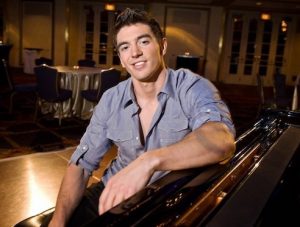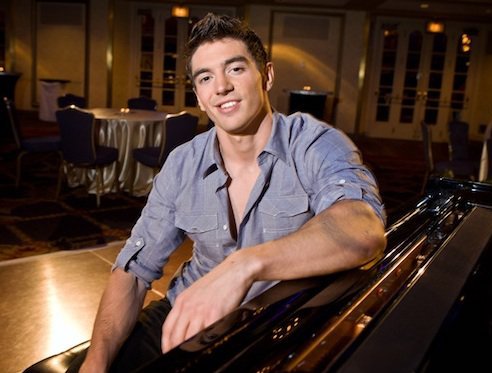STEVE GRAND is a singer and musician who plays the piano and the guitar and writes much of his own music. “All American Boy,” the song that launched his singing career in 2013, is also the name of his most recent album. The latter includes the hit song “We Are the Night,” a tribute to the LGBT community.
 Grand grew up in Lemont, Illinois, a Chicago suburb, and started playing the piano at age five, writing his first song at age eleven. He later picked up the guitar and all the while was developing his singing voice. After a brief stint as a model, he began performing his own music along with an eclectic mix of familiar songs.
Grand grew up in Lemont, Illinois, a Chicago suburb, and started playing the piano at age five, writing his first song at age eleven. He later picked up the guitar and all the while was developing his singing voice. After a brief stint as a model, he began performing his own music along with an eclectic mix of familiar songs.
I caught Grand’s act in Provincetown, a one-hour singing tour de force in which he alternates between piano and guitar. I interviewed him in person the next day. Find out more about Steve Grand on his website at www.SteveGrand.com.
Stephen Hemrick: In your act, you sing, you play the piano, and you play the guitar. Can you give us an overview of your musical background?
Steve Grand: I started playing piano when I was five years old. Even before that, I started constructing models of pianos out of cardboard and glue. I was fascinated with the piano æsthetically as a piece of furniture and started making models of them. I saw Charlie Brown and Schroeder at his little grand piano and thought that was just the coolest thing. So when we moved to our new house in the suburbs, one of the first things my parents did was buy this old upright piano, and I started taking lessons. I started playing guitar when I was around nine or ten years old.
I did everything music-oriented in school. I played piano in jazz band. I played flute in a symphonic and marching band. I did musicals. I was the lead in West Side Story in my senior year. I went to Belmont University for one year and studied songwriting there. All the rest of it has been mostly self-taught. I did songwriting on my own time because I found it therapeutic. It was how I felt I could express myself. I became obsessed with trying to figure out what made a song create so much feeling. And I wanted to be able to make other people feel like my favorite artists made me feel.
SH: So, who are your favorite artists? Who inspired your music?
SG: Elton John. Beautiful voice, beautiful songwriting, mysterious lyrics. And that he made the piano sexy was appealing to me. Among current artists, definitely Lady Gaga, because she’s so forthcoming about her influences, and the fact that she’s really in this to make music that she loves. She sometimes goes in her own artistic direction in ways that I can only imagine are often against her label’s wishes. I also like Bruce Springsteen, his very American vibe. And Lana Del Rey—she’s another current artist that I’m really inspired by.
SH: When did your career as a musician and songwriter kick off?
SG: When my song “All-American Boy” hit. I didn’t have a label, backing, management, or anything like that. I just made it with my own money, got a lot of my friends together, promised them booze and a fun time if they drove up three hours to Wisconsin, where I rented a house to film the video. Maxed out my credit card, but a week later, I was on Good Morning America and CNN.
SH: Your Midwestern roots come up in some of your songs. What was it like growing up in that part of the country as a gay kid?
SG: I grew up in the suburbs, close to Chicago but far enough away where it was kind of an insulated place. It was a tight-knit community and not extremely progressive. My town has more churches per capita than in any other town in the state. You drive over the bridge into town, and you see eleven steeples or so.
SH: How was your coming out experience?
SG: Well, I didn’t know I was gay until I was thirteen, and it kind of clicked because I had always felt like I was different. I never felt particularly effeminate. I just felt like an outcast and kind of a weird guy, like I didn’t fit in with the guys or the girls. I was in the Boy Scouts and was more like a nerdy, outdoorsy kind of guy. When I first got to school, the kids would make fun of me for playing the piano. I was so bewildered by that because I thought the piano was so cool. But I remember being in first grade and kids saying, “That’s gay.”
At first I didn’t want to be gay. I thought it was a bad thing because of my religious upbringing in a Polish Catholic family. So it took a while for me to accept myself, and it took a while for my family to be okay with it. But everyone’s great now, and we’ve come a long way.
SH: I’m somewhat embarrassed to admit that I first laid eyes on you as a model. How did you break into singing from modeling?
SG: It’s so funny because I worked my whole life on music. Then I did a couple of test photo shoots. I had no model presence, but I put myself on a website where I connected with a few photographers. I only did three or four shoots. It was an avenue I wanted to try. When you’re young, you just want to get your name out there any way you can. So I took a stab at it, but there didn’t seem to be a career in it. People in the industry would tell me I didn’t have the right proportions.
SH: Do you think it helped launch your musical career?
SG: Initially, sure. I think my look is appealing to people. I think inevitably, for every performer, their look plays into how people think of them.
SH: “All-American Boy” tells a story of unrequited love. You mentioned in your show that it was a collaboration with a good friend. Was it autobiographical?
SG: Yes. It was not like any one instance, but I had written a lot of songs about unrequited love, and I wanted it to be my first statement as an artist. Even as a kid I had very intense feelings, as a lot of us do as young people. When I would fall for guys that I couldn’t have, it was so heartbreaking. It was so hard for me, especially because often it would be a friend, and I would start to develop romantic feelings for him, but I wouldn’t tell him because I didn’t want to hurt the friendship. It’s something that we’ve all been through; it’s a human experience. Falling for someone you can’t have rings especially true for gay people, but it’s not exclusively a gay experience.
SH: You mentioned in your show that you’ve been sober for nineteen months. Can you talk about this on either a personal or societal level?
SG: I’m an intense person, and I think this kind of personality is often prone to addiction, of substances and otherwise. For me it manifested itself temporarily in alcohol. I had to recognize that it wasn’t working for me, that we’re not all created equally in that way. Some of us can have a drink or two now or then. For me, the second my lips touched alcohol… I was blacking out almost every day for a while.
For a year I tried to cut back because I couldn’t imagine my life without drinking; it had become such a part of it. But after you find yourself saying you’re sorry to people and apologizing for your behavior so many times, you have to be more introspective and say: “All right, how sorry am I if I’m continuing to do the same thing that ultimately leads me to being sorry?” So I thought I would just take it one day at a time. And one day I stopped, right around New Year’s. I didn’t even plan to stop for good.
But I’m so lucky, because for me it’s been so easy. Every day has been so clearly better because I’ve been sober. I think a lot of people don’t have the advantage of having such horrible experiences with alcohol. Some people are just kind of teetering on the verge. Also, I had a lot of good friends and my family. Most of my friends from high school don’t drink, which made it easy for me. For a lot of people, alcohol defines their whole social world. If everyone around you drinks, it’s very hard to stop. Granted, I’m in an industry where there’s a lot of drinking. It’s how you socialize. It’s how you have the courage to get up in front of strangers and sing. So it was a crutch. I think it’s part of growing up, taking ownership, and just saying “enough is enough.”
SH: How do you think it affects the LGBT community?
SG: Drugs and alcohol and other kinds of substances that people abuse clearly affect our community disproportionately. Gay people often come with more baggage because we’ve had the whole experience of coming out.
SH: You’ve also been an activist for LGBT equality. Can you talk about these activities?
SG: Well, my most recent charity thing I did was Broadway Bares in San Francisco, a benefit for REAF, the Richmond/Ermet Aid Foundation, which provides programs and support for LGBT homeless youth and people living with hiv/aids. It’s the first time I stripped down to a jock strap, and then to nothing, in a performance. That was so much fun. And we raised a lot of money. I’ve also toured Europe through the State Department. I served as kind of an ambassador to the country for the arts. I talked to people in Latvia and Lithuania and Austria about LGBT rights. And I performed and spoke at the first Euro Pride that was in a former Soviet country.
SH: You have the reputation of being a country singer, but you’ve distanced yourself from that. How did this notion get started?
SG: I think BuzzFeed was the first to say that. It never came from my lips, which is funny, because every news outlet has essentially disregarded that. “All-American Boy” is kind of a countrified rock ballad, but it’s pretty much the most country thing I’ve done in my career.
SH: Tell us something about yourself that most people don’t know.
SG: Let me think about that for a minute. I think on a personal level, I’m quite introverted, meaning that it takes a lot of energy for me to put myself out there and be social. I really get energized by being alone and by being creative by myself. I really like my alone time, my quiet time, and it’s been another nice thing about not drinking and not going out, because I never was really crazy about going out and just hanging out at bars. That just wasn’t fun.






